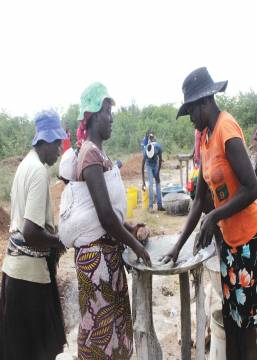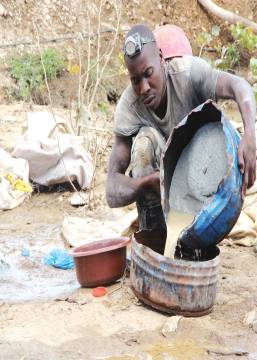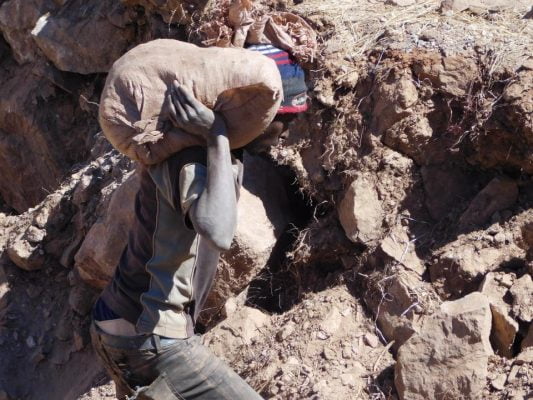A boom gate lowered at the entrance of a community owned mine in Silobela and a stern faced security guard armed with a knobkerrie, his dog strained against the leash in his hand, paints an intimidating picture.
However, this fear-inspiring security arrangment could not do anything when bouncers from Bulawayo allegedly hired by a local traditional leader, Chief Sigodo, invaded the mine fighting for their paymaster to control the gold-rich Peace Mine.
The attempt by the chief and his gang to forcefully seize the gold fields triggered a fierce battle with artisanal miners which started from the mine and spilled to the nearby business centre. Elderly women, innocent bystanders and customers were assaulted during the mayhem.
“We cannot operate freely anymore. The problem is that these bouncers are runners for some local leaders and senior politicians. They seem very powerful such that at times police officers are not able to contain them.”
Gogo Ncube is a widow whose four children died in rival gold gang wars in her home village, Shurugwi, leaving her with two sons. As a result, she was left with orphaned grandchildren to take care of.
The gloomy situation forced her to relocate to Silobela and work as a small scale miner with other community members who earn a living through panning.

Women at Peace Mine pan crushed ore to extract gold
The trust is led by the widow of the late Arthur Nkiwane who founded it in 2015 and passed on in 2017.
Since its inception the mine has been at the centre of violent control dispute. The stand-off has been exacerbated by rivalry between the community artisanal miners and Chief Sigodo’s gang who seek to challenge the dominance of the community artisanal miners.
The vicious wars escalated after the death of Nkiwane and the community believes that the gangs deliberately attack them because they are now led by the vulnerable widow.
“The Chief is supposed to have the community at heart, but he’s taking advantage of us women knowing fully well that we can’t go pound for pound with his men. Our hope now lies in the hands of the Government,” said Gogo MaNcube.
Operations manager of the trust Mr Malanga Nkiwane said the increasing level of violence and intimidation by the chief and his bouncers negatively affects mostly the widows and orphans who cannot defend themselves.
War veterans who are members of the trust have vowed to fight tooth and nail to jealously safeguard the mine from the clutches of the chief.
“We will take the war to him and hang him by his ‘jewels’ if that’s the only language he understands. We are not intimidated. We will defend our women and children that is why we had to go to the liberation war in the first place,” said Nkathazo Mdlongwa.
Chief Sigodo said he had no intention of creating rivalry with miners highlighting that he had taken the legal route to ensure that the community fully benefits from the mine.
“I am not fighting with people as some are alleging. In fact I haven’t set foot at the mine in a very long time because I want to do things in an orderly manner,” said Chief Sigodo.
The mine is home to more than a thousand male and female artisanal miners who directly benefit from the proceeds. Miners work in groups depending on gender and age.
The youth who are still strong are the ones who do the panning while the elderly work on the final stages of gold processing.
Some women have been pushed out of Peace Mine by the bloody clashes and now eke a living at the periphery of the mining fields as vendors of foodstuffs and an assortment of goods needed by miners for their day to day activities.
“Losing our mine to the Chief is our worst nightmare. Most of us women artisanal miners are at subsistence level earning just enough for our necessities. Children will be elbowed out to the streets and this will lead to a spate of prostitution,” said Monica Chinembiri (70).
Female miners emphasised that it was safe to work as a community because they are protected and they use the community machinery. They also do not have capital and requisite skills to mine on their own.
The biggest fear is that once they are on their own they will employ primitive methods of gold extraction such as amalgamation with mercury which has been scientifically proven to cause a myriad of diseases. Their dangerous processes will often be conducted at home without protective clothing, like cracking rock walls with handmade chisels without gloves to protect their palms and use their bare hands in scooping the mud.

Peace Mine artisanal miner busy at work
“Some in the sector opt to provide sexual services to male miners and they will be exposed to sexually transmitted diseases and other forms of abuse from often drunk illegal panners. It is often better than standing toe to toe with a gangster bent on killing you,” remarked one of the community miners Ms Suku Ndlovu.
“The future is uncertain. We implore the Government to rescue us by giving full control of the mine to the community and ban the Chief from interfering with production.”
“If they are to lose the mine, miners will be jobless and fail to pay fees. That will mean an abrupt end to pupils’ dreams,” said the teacher.
Apart from rampant abuse by their male colleagues, women in artisanal mining have to contend with a lot of challenges among them lack of proper equipment, pollution, low returns and poor working conditions.
Speaking at a recent mining for sustainable development workshop in Bulawayo, female participants claimed that the mining sector was hostile to them as they were being bullied by their male counterparts.
Bubi Small Scale Miners Association coordinator, Mrs Nobuhle Ncube, said women were vulnerable in the mining sector hence they wanted protection and special claims designed for them.
“We are viewed as inferior, some women artisanal miners have suffered violence and sexual harassment at the mines as they are being taken advantage of because most mining activities occur in the bushes, which are far away from homes and the police bases,” said Ncube.
“We have tools to help protect the mining sector and it is our responsibility to address people’s grievances,” she said.
The gang wars and bloodletting in small scale mines affect gold production and growth in the sector. This has dampened the Government’s effort to empower women and youth artisanal miners.
Speaking at a workshop for small scale miners in Gwanda, the Reserve Bank of Zimbabwe deputy director at the Bulawayo regional office Mr Kasanda Sibanda said the bank has availed $25 million to assist women and youth small scale miners to boost production but expressed concern in low turnout for takers.
“The bank has extended financial inclusion facilities for women and the youth. A total of $15 million was allocated for women and $10 million was allocated for youths but very little has been disbursed._The Chronicle
.png)




